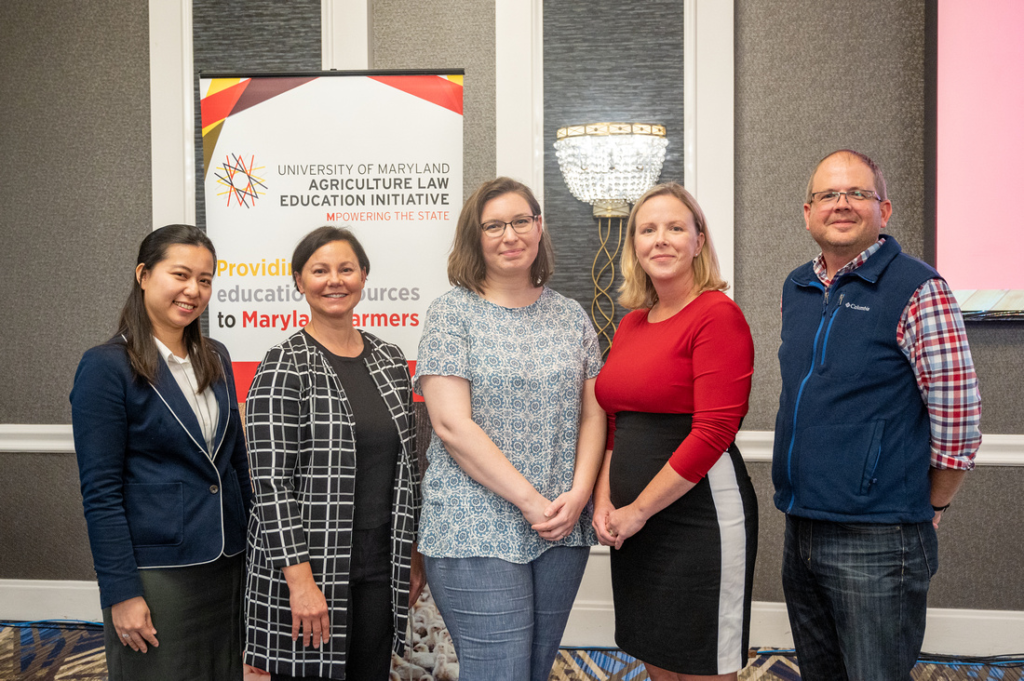
Ju-Ching Huang, a Doctor of Juridical Science candidate at Georgetown University Law Center, has been “diving deep into the legal and policy challenges for Maryland’s developing land-based recirculating aquaculture system seafood industry as well as investigating how climate change is impacting Maryland’s coastal aquaculture industry and its associated communities,” according to Nicole Cook, UMES Extension’s environmental and agricultural faculty legal specialist and Huang’s supervisor. Her charge, Cook said, is finding legal tools that can help the industry and communities better adapt to the impacts of the changing environment.
Huang was awarded a competitive Agriculture Law Education Initiative and Maryland Sea Grant legal policy fellowship this fall, the second of its kind. Since September, she has been researching state and local floodplain development and management, along with permitting of RAS facilities in order to learn first-hand how land use regulatory regimes intertwine with multiple levels of government and stakeholders such as property owners and other members of the community. The knowledge gleaned from her activities will benefit her dissertation and career goals of using her legal and policy expertise to continue filling in the gaps between scientists and policymakers relating to land use and climate change.
“Maryland Sea Grant has long supported science-based decision making. We also recognize the importance of understanding legal issues in balance with scientific inquiry,” said Fredrika Moser, director of the Maryland Sea Grant College Program. “This fellowship position provides an excellent bridge between science and legal experts to further advance Maryland Sea Grant’s and ALEI’s capacity to inform coastal policy.”
ALEI and MDSG teamed up in 2018 to procure NOAA Sea Grant funding for the fellowship program designed to “create a collaborative coastal law and policy resource in Maryland for the benefit of both programs and our stakeholders,” Cook said. The first fellow, Elissa Torres-Soto, went on to become a staff attorney at the Environmental Law Institute. The fellows’ projects are selected in collaboration with an advisory committee which includes members from the Maryland Department of Natural Resources, Virginia Coastal Policy Center, Georgetown University Law Center, the Chesapeake Legal Alliance, the University of Maryland Center for Environmental Sciences Board of Visitors, MDSG and ALEI.
Huang’s love for the land, coast and ocean comes as a native islander of Taiwan. It is the driving force behind her research and career path incorporating an interdisciplinary arena where law and science can complement each other in policy-making processes. Huang applied to the fellowship because it “allows [her] to work side-by-side with coastal and marine scientists as well as policy makers and regulators on issues from building coastal resilience in coastal communities to developing a practical, comprehensive and equitable legal framework for supporting land-based sustainable recirculating aquaculture systems.”
The S.J.D. is the highest level of law degree for law professionals who have already earned other advanced law degrees. Huang holds a Master of Laws in environmental law and policy from Stanford Law School. Her dissertation research explores, “the nexus between land-use decision-making and climate change governance.” In addition to environmental jurisprudence, Huang is particularly interested in land use laws, legal geography and administrative laws. She practiced as an attorney in Taiwan in a boutique law firm, as legal counsel and planner for the Taipei Urban Regeneration Center and as a policy staffer for the Minister of the Interior. At the Ministry, her work involved laws and policies including national land use from urban planning to coastal management, wetland conservation and national parks. She also previously worked at Georgetown’s Climate Center.
The Agriculture Law Education Initiative is a collaboration of the University of Maryland Francis King Carey School of Law at the University of Maryland, Baltimore; the College of Agriculture & Natural Resources at the University of Maryland, College Park); and the School of Agricultural and Natural Sciences at the University of Maryland Eastern Shore. ALEI is an initiative of the University of Maryland Strategic Partnership: MPowering the State, a collaboration between UMB and UMCP. This partnership leverages the sizable strengths and complementary missions of both institutions to strengthen Maryland’s innovation economy, advance interdisciplinary research, create opportunities for students, and solve important problems for the people of Maryland and the nation.

